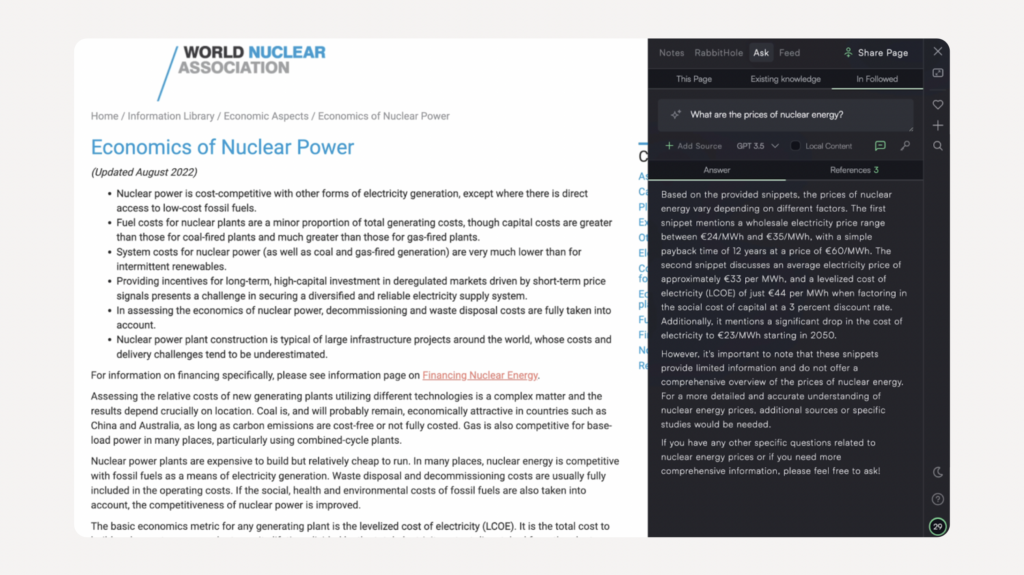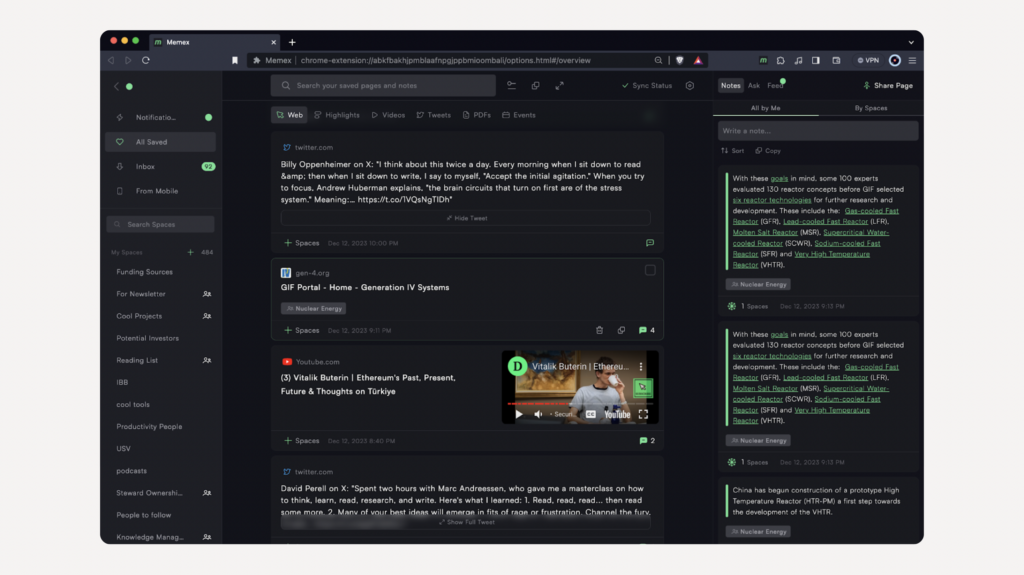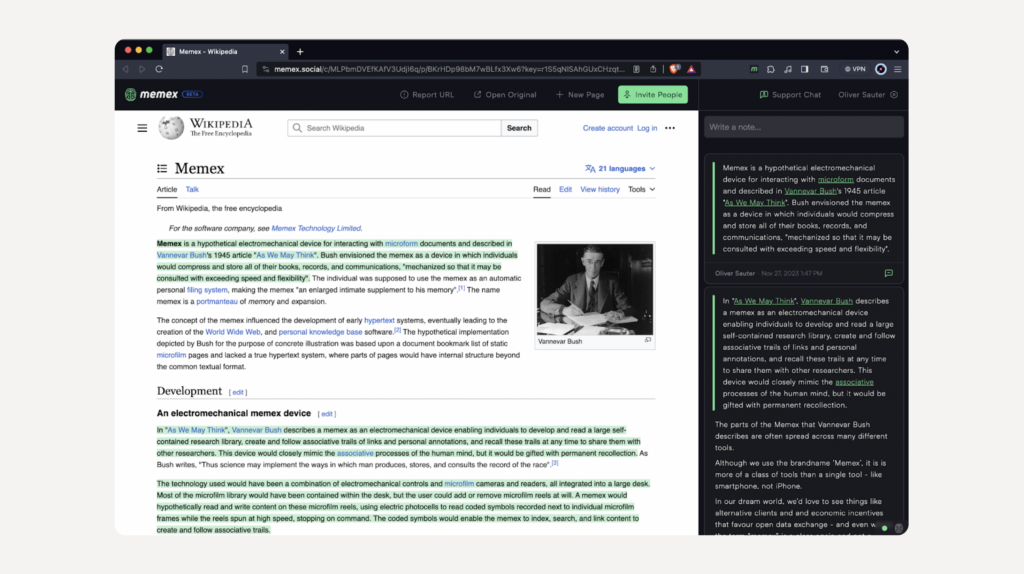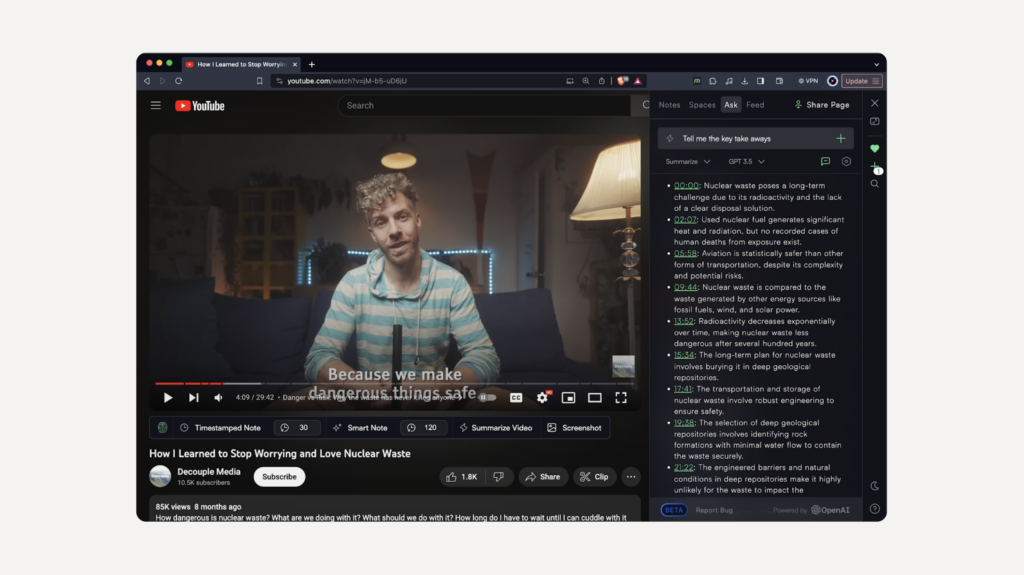Welcome to this edition of our Tools for Thought series, where we interview founders on a mission to help us think better and work smarter. Oliver Sauter is the founder of Memex, a tool designed to help you better read and research online, by yourself and with the collective knowledge of your most trusted writers, researchers, friends and team members.
In this interview, we talked about the history of hyperlinked knowledge, the chicken-and-egg problem in online collaborative reading, how to process large amounts of information in meaningful ways, and much more. Enjoy the read, and make sure to check out the exclusive discount all the way down the page!

Hi Oliver, thanks so much for agreeing to this interview. We can’t start without asking you about the name you chose for Memex, which has a long history.
Memex is a dream by the scientist Vannevar Bush, also known as a key figure in the Manhattan Project, to have a device that allows to search, annotate, connect and share his knowledge more effectively with peers.
Vannevar laid out his ideas in a 1945 article As we may think in the Atlantic Magazine that got it somewhat of a cult status among people interested in knowledge management and collective intelligence. It is often cited as a key inspiration for early Hypertext eventually leading up to the creation of the world wide web.
Bush envisioned Memex to work on microfilm which is an obvious technical reason why this never really came to fruition back then. So naturally once this name made it to the shores of my mind, it seemed like a very fitting for what (our version of a) Memex allows users to do: save, annotate and share what you read and research online, by yourself or with your team.
Let’s start with your vision. You are on a mission to help people build on the research of their most trusted writers, researchers and peers. Why tackle this specific challenge?
From the start our north star for Memex was to contribute ways for people to overcome the impact of misinformation and polarization. Otherwise as a society we won’t be able to solve the most difficult challenges of our time. Not because there is no way forward but because we won’t agree on what it is.
In the last decade we could watch in real time how the internet morphed from being a place of knowledge exchange to one where it’s easy to get distracted, misled and into ideological trench warfare. Even as a skilled researcher, it’s becoming hard to know who and what to trust, and where to find good information sources for more targeted research questions. AI generated content will make it even more difficult.
Unfortunately the lowest barrier to get other opinions are social media comment sections, but there we have to endure scrolling through feeds and get distracted and monetised — and it’s simply too much serendipity. Especially when you have more targeted questions.
And on the other hand there are so many writers and researchers out there that I trust but it’s hard to keep up with all their work or know when they write about something I need an answer for.
Memex aims to bridge that knowledge gap and make it possible to read and research with the collective knowledge of your most trusted writers, researchers and peers – and easily compare their perspectives.
My key insight came from being involved in fact checking communities in around 2015-2017 and saw how that work is not really scalable, nor do people tend to believe fact-checked information that comes from a source they don’t already trust. So all our work’s impact seemed very limited.
What I realized is that people want to make their own mind up – they want to come up with the answer with free will, otherwise they won’t believe it.
The most impactful approach to change people’s mind seemed to be to provide people with low friction ways of comparing different perspectives to understand more nuance, even if that nuance is not 100% correct.
I believe that this would create many more iterative improvement of mindset shifts where more people understand some grey areas and transitive knowledge. That then leads to more groups sharing similar understandings or “intersubjective truths”, that again are compared and understood, leading to the next iteration cycle.
However, the key challenge here is how to make it easy and interesting for people to share their views. Collaborative efforts such as Wikipedia are very rare blimps of social technology that still require a lot of work by a few dedicated volunteers and are a model not scalable for the dynamic real-time nature of the web.
In order for people to share their research with Memex, it had to first solve a personal/group productivity problem at the core, so people use it just for their own benefit at first, but making it increasingly easy to share their knowledge with others.
And that’s when I started working on it to solve my own itch: Not being able to easily capture the most important things I read, and make notes while doing so without breaking my flow by copy pasting stuff around.
Memex is collaborative too. You can annotate and discuss websites, PDFs and videos with your peers. We use it as a shared reading list for our team. We also just released our new Rabbit Hole feature which I think is the closest to our mission for enabling people to build on each other’s work we’ve been so far.
Now you can follow your favorite writers and researchers and use AI to search and answer questions with those sources in mind, and get related content recommendations from them while browsing around. It almost feels like downloading someone else’s brain.

This sounds like many other lines of work would benefit from having better reading and research tools, and having access to their peer’s knowledge?
We’ve seen people using many different reasons, like personal reading and research organization, sharing their research and collaborative annotation with friends or colleagues.
Other more specific use cases we’re seeing often are founders and product/sales teams collecting customer insights from the web and on social platforms; academic and corporate research teams with the need to collaboratively discuss the latest research papers; teachers and coaches use Memex’ ability to share lists of pages and annotations with their clients and students.
I can’t wait to see how people use our new Rabbit Hole feature. With it you can ask our AI questions across the pages you saved and all the RSS feeds you follow.
Why do you think nobody has solved the problem of online reading collaboration so far?
As a community of knowledge toolmakers we are just beginning to solve the problem of collaborative writing and reading with still lots of work ahead of us.
Part of it is that the market of digital note taking is just starting to ramp up. Until the pandemic many people didn’t work that much digitally. Covid combined with the rise of new note-taking tools like Roam, Obsidian and Notion were really a perfect storm for making digital note-taking and reading much more a common workflow for people.
We also consider the problem of collaboration to be downstream of personal note taking, so we’re expecting a lot more people entering the market in the next few years.
But there is another problem: It does not work without people. I think our new Rabbit Hole feature could change a lot here because it removes one of the biggest frictions for online collaboration in reading and research: every collaboration tool requires other people to sign up and share information for it to be useful to you. Classic chicken-and-egg problem.
Rabbit Hole changes that because it enables people to use AI to ask questions across their favorite blogs, personal bookmarks and soon also shared team documents. That’s all information already being shared but just way too much to process right now.
AI has changed a lot of things to make the problem approachable because you can process much larger amounts of information, and even if people don’t share in a new network, you can now do things like Rabbit Hole where you can process already existing information more effectively.
Just think through the amount of work it would take for literature review when you have to sift through hundreds of articles just to find an answer – which is now possible to get within a few seconds.
This is a knotty problem. Tell us how you’re approaching it—the product philosophy and guiding principles behind Memex.
One design objective was to bring as much power as we can into the browser tab so that people have the least amount of context switches due to needing to copy paste around links and notes.
We’ve also added a bunch of AI powered features in the past year and think they are well placed in areas where they can save people a lot of time, without overwhelming the core of the product. Moving forward with the Rabbit Hole feature, AI will become a bit more prominent in its goal to help people synthesize large amounts of their own and followed knowledge.
As a company we’ve built our tool without taking classic venture capital investments that have uncapped return expectations. We think they’ll ultimately lead to profit maximization incentives that disproportionately affect users through extractive business practices – often not in the beginning but in the long run as the company reaches its natural growth limits. Often you feel its effect in the forms of more addictive algorithms or more lock-ins.
Instead we use a model called “Steward Ownership” which limits investor and team returns and prevents the company from being sold to external investors. For those interested, here is a talk I gave about it.
Specifically, how does it work?
Memex is a really great allrounder to help you with your online reading and research. If you are an avid reader of websites/papers/videos or have to do literature reviews with friends or your team I am pretty sure you’ll find something in Memex that can support you with 2-3 high value workflows.
Memex touches on many parts of the knowledge work life cycle:
- Understand: Summarize and ask questions about websites, PDFs and YouTube videos, all your bookmarks and RSS feeds.
- Capture: Organize and full-text search and annotate websites, local and url-based PDFs and YouTube videos.
- Share and collaborate: Collaborate on annotated pages or lists of content, even with people who don’t use Memex.
- Integrate: Live sync with Readwise, Obsidian and Logseq, and customisable copy-to-clipboard export and an API.
What about research as part of a team or a community? Many tools keep knowledge in silos and make it hard to collaborate.
Memex can also be used to collaboratively organize and annotate websites, PDFs and Youtube videos with your friends or team – and they don’t have to install any extra tools. Our design objective was to make collaboratively annotating and discussing content as easy as working on a Google Doc.
It takes just one click to create sharing links to annotated pages and PDFs (soon also local PDFs!) that others can open and collaboratively annotate in an accessible web interface.
Here is an example of such a link. You can also annotate on it because you’ll have contributor access.

You can also simply add any url to a public website or PDF to get started annotating a page in less than 10 seconds without installing any tools.
Another challenge is video-based learning.
In the past year Memex became a powerful tool for improving one’s learning on YouTube. You can now really easily make time stamped notes, capture screenshots and use AI to summarize and ask questions about sections or entire videos.

You can also share those notes with a single click with people who don’t even use Memex. Here is a short demo.
What about you, how do you use Memex?
Memex really became like a swiss army knife for my reading and research, doing a lot of small things well for me.
For example as a founder I constantly find new clients, investors and customer insights while reading articles or being in other workflows. Memex helps me to capture those ideas without breaking my flow because I can tag and annotate articles, Twitter profiles and chat/email logs without leaving the tab I am on. Later when I have to reach out to people or find customer voices for a feature request it takes me only a few seconds to get back to them.
Another one of my favorite and most often used features is the Youtube annotation and summarisation, especially for videos I am interested in the gist or an overview of it but don’t want to watch a 10+ minute video for. With the inline timestamps in the summary I can also quickly jump to the relevant sections of the video.
A feature that I think will quickly become my favorite one is Rabbit Hole. I often have open-ended research sessions where I drop into niche knowledge where it is hard to find information or opinions by going to Google, but I know probably some of the people I follow have written about it.
Having the ability to consult all my previous bookmarks and the people I already follow, and getting related content recommendations from there will really supercharge this workflow for me.
With Rabbit Hole I can also finally escape the bookmarking blackhole with the thousands of pages and notes I saved but would usually never be able to make use of again — if I am being realistic.
How do you recommend someone get started?
Simply go on the website and download the extension. You should be up and running in less than 30 seconds. The most important UX interaction is the little tooltip in the bottom right corner of your screen where you can save, organize and summarize what you read.
I also want to give a 20% discount on all our premium plans, including the lifetime plan to all your readers applicable in the next 30 days. Use NESSLABS2023 as the code on checkout!
And finally… What’s next for Memex?
We still have a ton of work to do to get to our original goal of helping people to have better information quality and diversity. I think we have barely scratched the surface of what AI can do to help us process more information better and I am very excited about exploring this path more.
The intersection between human and AI based curation seems to me like a very promising path forward on our long-term mission.
Thank you so much for your time, OIiver! Where can people learn more about Memex?
You can watch a 90s demo of the Memex extension or a 60s demo of Rabbit Hole. We have also published more information about our Steward Ownership Investment model. Finally, visit our website and follow our journey on Twitter.
